Safeguarding Your Business: Navigating the Aftermath of a Road Traffic Collision
Are you aware of the latest Police rules when it comes to a RTC and how you can protect drivers?

As a driving recruitment agency, we understand the critical role that professional drivers play in the success of your business. They are the backbone of your operations, ensuring that goods are delivered on time and services are provided efficiently. However, it's crucial to acknowledge that accidents can happen on the road, and being prepared for the unexpected is essential for safeguarding both your drivers and your business.
At Driver Require, we are fortunate enough to have operated for over 20 years with no fatal accidents and therefore became complacent when it came to processes for police-attended Road Traffic Collision’s (RTC). In the last month alone we’ve had two incidents where our drivers were directly involved in RTCs caused by 3rd party suicides. In both cases we couldn’t get to the drivers in time so they and the client didn’t have legal help at hand in the immediate aftermath of the incident. These were unavoidable, non-fault accidents but they have shocked us into action and we want to share our knowledge with others.
Did you know that a police-attended Road Traffic Collision (RTC) is the only situation in which the Police can arrest the driver but do not need to issue them with a caution and anything they say can be "given in evidence" in court, i.e. it can be used to convict them of a criminal offence and could result in a prison sentence?
If any other party in the RTC is injured, even with only minor injuries, it is possible the driver could be charged with causing "Serious Injury by Careless Driving". A "Serious Injury" includes a fractured or broken bone or a cut that pierces through the skin, so it doesn’t take a lot to meet the criteria. If they are convicted, the sentence can be up to 2 years in prison!
If your drivers are involved in an RTC the only information they are legally obliged to tell the Police is their name and the registration number of their vehicle. Refusing to say anything else is not regarded as obstruction of justice.
It is very easy for a driver to self-incriminate themselves without realising. A simple leading question from the police asking if they’re tired, could be enough to convict the driver. At this point it’s not just the drivers at risk; both us as the agency and the end client could develop liability from wrong doing when there’s a conviction. It’s important that you:
- Have Emergency Protocols in Place: Establish clear protocols for drivers to follow in the event of an accident. This should include steps for reporting the incident, ensuring driver safety and collecting relevant information.
- Ensure Legal Guidance: In the aftermath of a collision, it’s vital to seek legal advice promptly. Having legal counsel experienced in handling road traffic collision cases can protect your interests and help navigate any potential legal disputes.
- Post-Incident Support: Offer support to drivers involved in accidents, both emotionally and practically. Open communication channels and access to counselling services can help them cope with the aftermath.
Here at Driver Require, our commitment goes beyond simply placing drivers in roles. We care about the wellbeing of drivers and the success of your business. By taking proactive measures to mitigate the risks associated with road traffic collisions, you can protect your drivers, your reputation and your bottom line. Let us know if your legal counsel doesn’t provide support and we’ll be happy to point you in the right direction.
Google Reviews
-
 Dave GallacherGood range of jobs available, decent rates of pay. Always able to get in contact with the office or someone on call with good knowledge and understanding of the job or role sent to. Never had an issue with pay, easy timesheet process
Dave GallacherGood range of jobs available, decent rates of pay. Always able to get in contact with the office or someone on call with good knowledge and understanding of the job or role sent to. Never had an issue with pay, easy timesheet process -
(1).png?r=a2-s120.120-o) Ionel Lucian DinicaVery easy to find work , very nice and kind staff, all details explained very easy. Highly recommended.
Ionel Lucian DinicaVery easy to find work , very nice and kind staff, all details explained very easy. Highly recommended. -
 Catalin SirgheA reliable and efficient agency. I’ve had a positive experience with Driver Require. They have consistently paid on time and have never cancelled a shift. The communication is excellent. If you’re looking for a reliable agency that values its drivers, Driver Require is a great choice.
Catalin SirgheA reliable and efficient agency. I’ve had a positive experience with Driver Require. They have consistently paid on time and have never cancelled a shift. The communication is excellent. If you’re looking for a reliable agency that values its drivers, Driver Require is a great choice.
